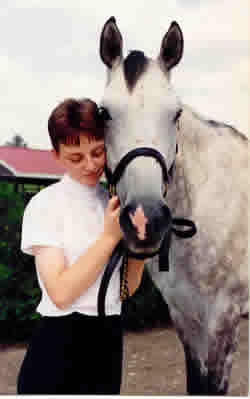
|

Prof. Cindy Adams
|
Getting
back in the saddle may be a potent tool for trauma recovery
|
The bond between horseback
riders and their animals may be strong enough to help people recover from
extreme fear and anxiety, say OVC researchers. And understanding the significance
of the alliance between horse and rider may eventually provide some help
for horses in recovery as well.
Prof. Cindy Adams,
department of Population Medicine, is working with graduate student Janet
Yorke to examine the "therapeutic alliance" of the human-equine
bond. They think this attachment may help alleviate the suffering of people
who have been through traumatic physiological or psychological stress.
"We know that
fear and anxiety can be transferred to other aspects of a person's life,
such as riding," says Yorke. "I think people could really be
reached through the use of horses in therapy."

The researchers are
focusing on men and women, but a recent finding by the Canadian Equestrian
Federation showed that women comprise the largest growing segment of the
companion horse owner population. In fact, 75 per cent of new horse owners
are women, most of them baby boomers.
Adams and Yorke are
interviewing 50 riders who say horseback riding influenced their recovery
from traumatic situations such as car accidents, illness, or physical
or sexual-abuse. They will look at what experiences interviewees identify
as traumatic and how their relationship with a horse helped or didn't
help them cope.
They hope to find
out if "getting back in the saddle" affects the emotional and
psychological recovery of riders experiencing post-traumatic stress.
Questions for the
survey will be developed in collaboration with a multidisciplinary team
of professionals from sociology, psychology, veterinary and epidemiology
backgrounds. The researchers will identify themes and patterns through
standardized data analysis. They hope this will lead to more quantitative
investigation, such as video-taping riders through their recovery period,
and researching the demographics of respondents.
Yorke says the research
will measure the effects of the therapeutic alliance according to the
amount of time a rider spends with a horse and the nature of their riding.
"The intensity
and proximity of the relationship before and after a traumatic situation
are very important factors," says Yorke. "There's a difference
between performance riders and those who ride more casually for pleasure."
Yorke has more than
30 years of social work experience and has volunteered for a therapeutic
riding program for children with physical disabilities. She observed physiological
and emotional benefits such as improved fine and gross motor skills and
reduced tension in the program's participants.
"I hope people
will have a better understanding of the therapeutic value of riding as
a result of this research," she says.
For more information
or to pledge your support for this study contact the Equine Research Centre
(519) 837-0061 or email info@erc.on.ca.
- Katie Meyer, SPARK
www.erc.on.ca
|

